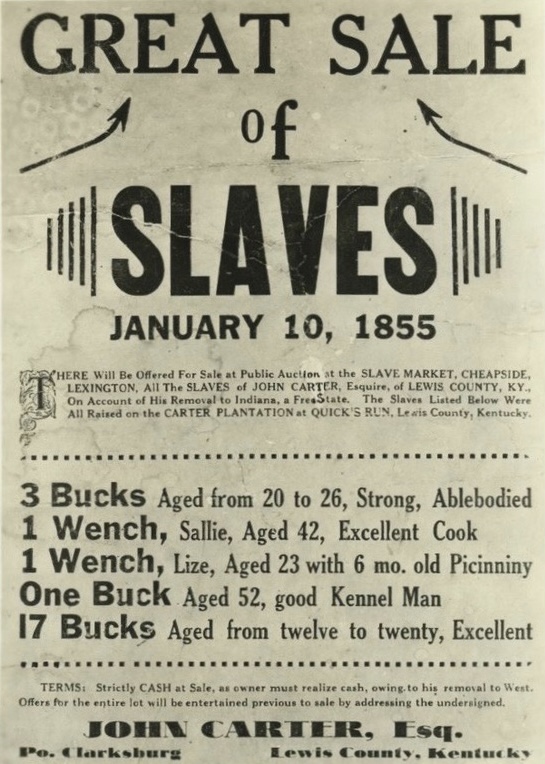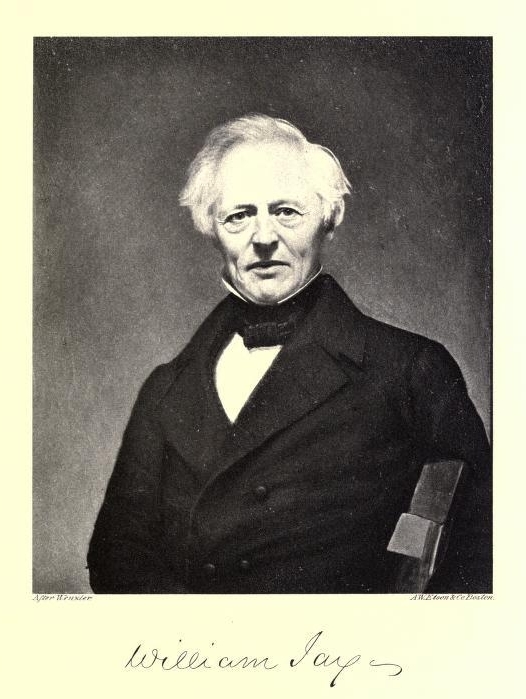|
James F. Purvis
James Franklin Purvis (April 23, 1880) was an American slave trader, broker, and banker who worked primarily in Baltimore. He was a nephew of Isaac Franklin of Franklin & Armfield, and traded in Maryland, Louisiana, and Mississippi in the 1830s and early 1840s. In 1842 he became a devout Methodist, quit the slave trade, and transitioned into real estate, banking, and stock brokering. After his bank failed in 1868, he retired to Carroll County, Maryland, where he died of a heart attack in 1880 at age 72. Slave trade Allen Purvis and Margaret Franklin were married on December 27, 1806, and their son James F. Purvis was born about 1808 in Tennessee. Purvis' mother, Margaret Franklin, was older sister to Isaac Franklin, founder of the interstate slave-trading firm Franklin and Armfield Office, Franklin & Armfield. His father, Allen Purvis, was also a slave trader, who "in the early nineteenth century both sold people in Natchez, Mississippi, Natchez himself and consigned enslaved ... [...More Info...] [...Related Items...] OR: [Wikipedia] [Google] [Baidu] |
Jourdan M
{{surname ...
Jourdan may refer to: *Carolyn Jourdan, American author *Claude Jourdan (1803–1873), French zoologist and paleontologist *David W. Jourdan, businessman *Jean-Baptiste Jourdan (1762–1833), French army commander * Jourdan Bobbish (1994–2012), prominent American murder victim *Jourdan Dunn, British fashion model *Jourdan Lewis, American football player *Louis Jourdan (1921–2015), French actor *Phil Jourdan, writer *Pierre Jourdan (1932–2007), French actor and director *Jourdan Urbach, retired violinist See also * Jordan (other) Jordan is a country in the Middle East. Jordan or Jordán may also refer to: People * Jordan (name), a list of people with this given name or surname ** Michael Jordan, former NBA Player * Jordan (footballer, born 1932), Jordan da Costa, Brazilia ... [...More Info...] [...Related Items...] OR: [Wikipedia] [Google] [Baidu] |
Slave For Life
This is a glossary of American slavery, terminology specific to the cultural, economic, and political history of slavery in the United States * Acclimated: Enslaved people with acquired immunity to infectious diseases such as cholera, smallpox, yellow fever, etc. * Broad wife: Also ''broad husband''; spouse of an enslaved person who lived on another plantation or in another settlement. * Buck: Male enslaved person, usually of reproductive age and often with a sexually suggestive connotation. * Coastwise: Transportation of enslaved people by ocean-going ship between the Atlantic and Gulf coasts. * Coffle: Group of enslaved people in a chain-gang for overland shipment on foot. * Field holler: African-American work songs with roots in the plantation era * Gang system: Form of enslaved-labor management, contrast task system * Griffe: Also, griffonne, a color/race descriptor most commonly used in Louisiana, usually describing someone who was one-quarter white and three-quarters b ... [...More Info...] [...Related Items...] OR: [Wikipedia] [Google] [Baidu] |
Free People Of Color
In the context of the history of slavery in the Americas, free people of color (French: ''gens de couleur libres''; Spanish: ''gente de color libre'') were primarily people of mixed African, European, and Native American descent who were not enslaved. However, the term also applied to people born free who were primarily of black African descent with little mixture. They were a distinct group of free people of color in the French colonies, including Louisiana and in settlements on Caribbean islands, such as Saint-Domingue (Haiti), St. Lucia, Dominica, Guadeloupe, and Martinique. In these territories and major cities, particularly New Orleans, and those cities held by the Spanish, a substantial third class of primarily mixed-race, free people developed. These colonial societies classified mixed-race people in a variety of ways, generally related to visible features and to the proportion of African ancestry. Racial classifications were numerous in Latin America. A freed ... [...More Info...] [...Related Items...] OR: [Wikipedia] [Google] [Baidu] |
Thomas Jackson (slave Trader)
Thomas, Tom, or Tommy Jackson may refer to: Academics *Thomas H. Jackson (born 1950), ninth president of the University of Rochester *Tom Jackson Jr. (born 1959), president of Black Hills State University, South Dakota * Thomas "Thom" Jackson (born 1960), American educational entrepreneur Arts and entertainment *Thomas Jackson (architect) (1807–1890), Irish architect *Thomas R. Jackson (1826–1901), English-born American architect *Thomas Graham Jackson (1835–1924), architect *Thomas Jackson (author), author of the 1905 book ''The Lost Squire of Inglewood'' *Thomas Jackson (actor) (1886–1967), American actor in ''Manhattan Melodrama'' *Tommy Jackson (musician) (1926–1979), American country music fiddle player *Tom Jackson (actor) (born 1948), Canadian Métis actor and singer Military *Stonewall Jackson (Thomas Jonathan Jackson, 1824–1863), Confederate general ** ''Thomas Jonathan Jackson'' (sculpture), a 1921 bronze equestrian sculpture of Stonewall Jackson *Thomas Stu ... [...More Info...] [...Related Items...] OR: [Wikipedia] [Google] [Baidu] |
William Crow (Virginia)
William Crow may refer to: *William Crow (MP) (fl. 1698–1699), Irish politician *William E. Crow (1870–1922), American lawyer and Republican party politician *William J. Crow (1902–1974), U.S. Representative from Pennsylvania *Bill Crow William Orval Crow (born December 27, 1927) is an American jazz bassist. Among other work, Crow was the long-term bassist in saxophonist Gerry Mulligan's bands in the 1950s and 1960s. Early life Crow was born on December 27, 1927, in Othello, ... (born 1927), jazz guitarist See also * William Crowe (other) {{hndis, Crow, William ... [...More Info...] [...Related Items...] OR: [Wikipedia] [Google] [Baidu] |
University Of Virginia
The University of Virginia (UVA) is a public research university in Charlottesville, Virginia. Founded in 1819 by Thomas Jefferson, the university is ranked among the top academic institutions in the United States, with College admissions in the United States, highly selective admission. Set within the The Lawn, Academical Village, a World Heritage Site, UNESCO World Heritage Site, the university is referred to as a "Public Ivy" for offering an academic experience similar to that of an Ivy League university. It is known in part for certain rare characteristics among public universities such as #1800s, its historic foundations, #Honor system, student-run academic honor code, honor code, and Secret societies at the University of Virginia, secret societies. The original governing Board of Visitors included three List of presidents of the United States, U.S. presidents: Thomas Jefferson, Jefferson, James Madison, and James Monroe. The latter as sitting President of the United ... [...More Info...] [...Related Items...] OR: [Wikipedia] [Google] [Baidu] |
Alexandria, Virginia
Alexandria is an independent city in the northern region of the Commonwealth of Virginia, United States. It lies on the western bank of the Potomac River approximately south of downtown Washington, D.C. In 2020, the population was 159,467. The city's estimated population has grown by 1% annually since 2010 on average. Like the rest of Northern Virginia and Central Maryland, modern Alexandria has been influenced by its proximity to the U.S. capital. It is largely populated by professionals working in the federal civil service, in the U.S. military, or for one of the many private companies which contract to provide services to the federal government. One of Alexandria's largest employers is the U.S. Department of Defense. Another is the Institute for Defense Analyses. In 2005, the United States Patent and Trademark Office moved to Alexandria, and in 2017, so did the headquarters of the National Science Foundation. The historic center of Alexandria is known as Old Town A ... [...More Info...] [...Related Items...] OR: [Wikipedia] [Google] [Baidu] |
Isaac Franklin (brig)
The ''Isaac Franklin'' was an American Coastwise slave trade, coastwise slave ship operated in the 1830s that was initially owned by and named for slave trader Isaac Franklin. ''Isaac Franklin'' was a steam-powered brig with one deck, two masts, and a square stern, measuring 189 8/95 tons. She was described in one advertisement as "coppered [and] copper-fastened." A manifest from 1837, held at the New-York Historical Society, lists Lawrence Millaudon, a sugar planter, and George Lane, as the consignees of a shipment of 73 enslaved people sailing from Alexandria, District of Columbia, to New Orleans on the brig ''Isaac Franklin''. ''Isaac Franklin'' was sold to slave trader George Kephart of Alexandria around 1837; her sister ships ''Uncas (brig), Uncas'' and ''Tribune (brig), Tribune'' were sold to slave trader William H. Williams (slave trader), William H. Williams of Washington City, District of Columbia. One of the later owners of ''Uncas'' was Brazilian slave trader Manoel Pi ... [...More Info...] [...Related Items...] OR: [Wikipedia] [Google] [Baidu] |
Packet Boat
Packet boats were medium-sized boats designed for domestic mail, passenger, and freight transportation in European countries and in North American rivers and canals, some of them steam driven. They were used extensively during the 18th and 19th centuries and featured regularly scheduled service. When such ships were put into use in the 18th century on the Atlantic Ocean between Great Britain and its colonies, the services were called the packet trade. Steam driven packets were used extensively in the United States in the 19th century on the Mississippi and Missouri rivers, supplying and bringing personnel to forts and trading posts. History Packet craft were used extensively in European coastal mail services since the 17th century, and gradually added cramped passenger accommodation. Passenger accommodations were minimal: transportation, "firing" (i.e. a place to cook), drinking water (often tasting of indigo or tobacco, which the water casks had previously held), and a place ... [...More Info...] [...Related Items...] OR: [Wikipedia] [Google] [Baidu] |
William Jay (jurist)
William Jay (June 16, 1789 – October 14, 1858) was an American abolitionist and jurist, son of Governor of New York and first U.S. Supreme Court Chief Justice John Jay. Early life Jay was born in New York City on 16 June 1789, in between his father's terms as United States Secretary of Foreign Affairs in the administration of George Washington. He was the son of John Jay (1745–1829) and Sarah Van Burgh (née Livingston) Jay (1756–1802). Among his older siblings was Peter Augustus (who served as Recorder of New York City under Richard Riker), Susan, Maria, and Ann Jay. His maternal grandparents were Susannah (née French) Livingston and William Livingston, an attorney who was a signer of the United States Constitution and later served as the first post-colonial Governor of New Jersey during the American Revolutionary War. His paternal grandparents were Peter Jay, a wealthy trader in furs, wheat, timber, and other commodities, and Mary (née Van Cortlandt) Jay (da ... [...More Info...] [...Related Items...] OR: [Wikipedia] [Google] [Baidu] |





